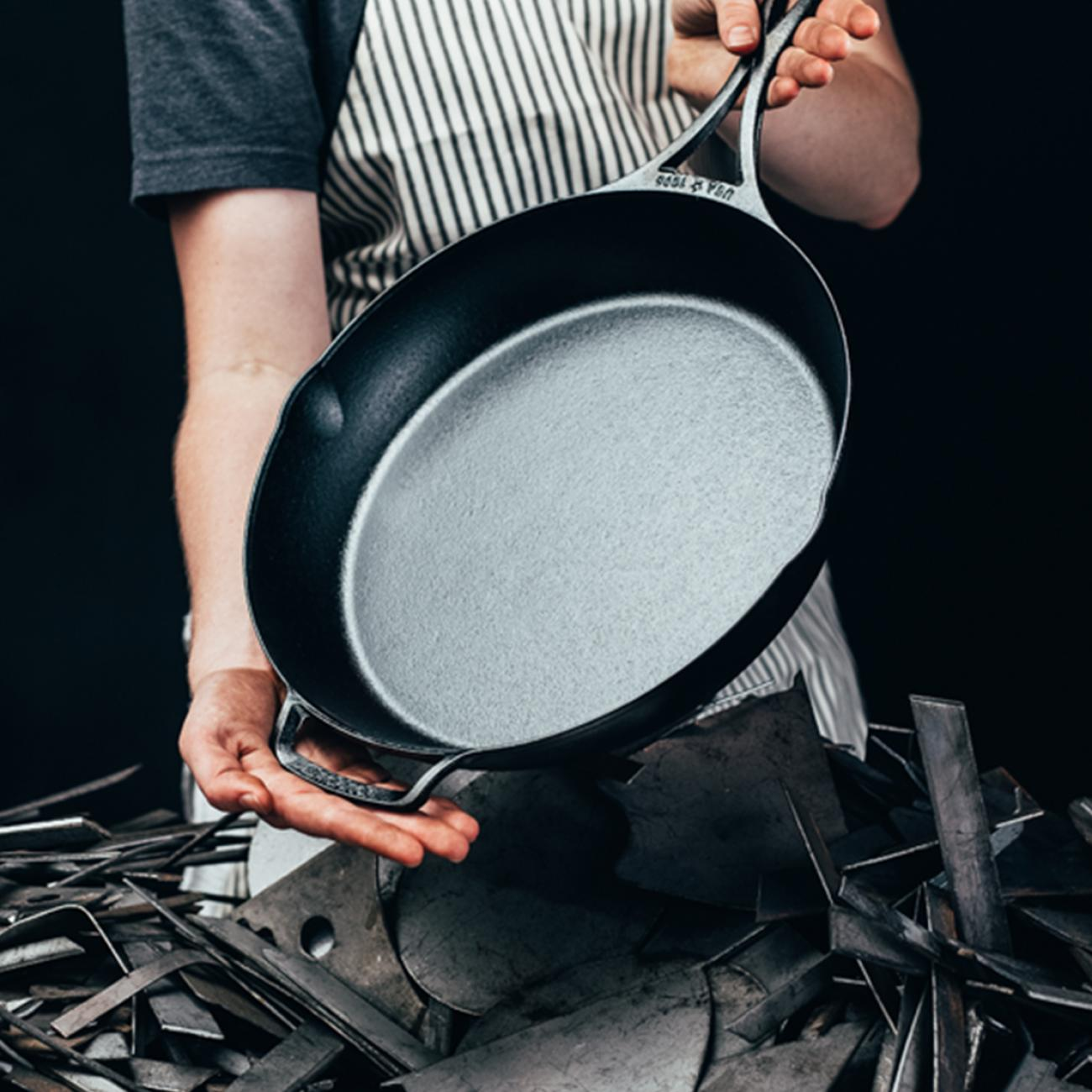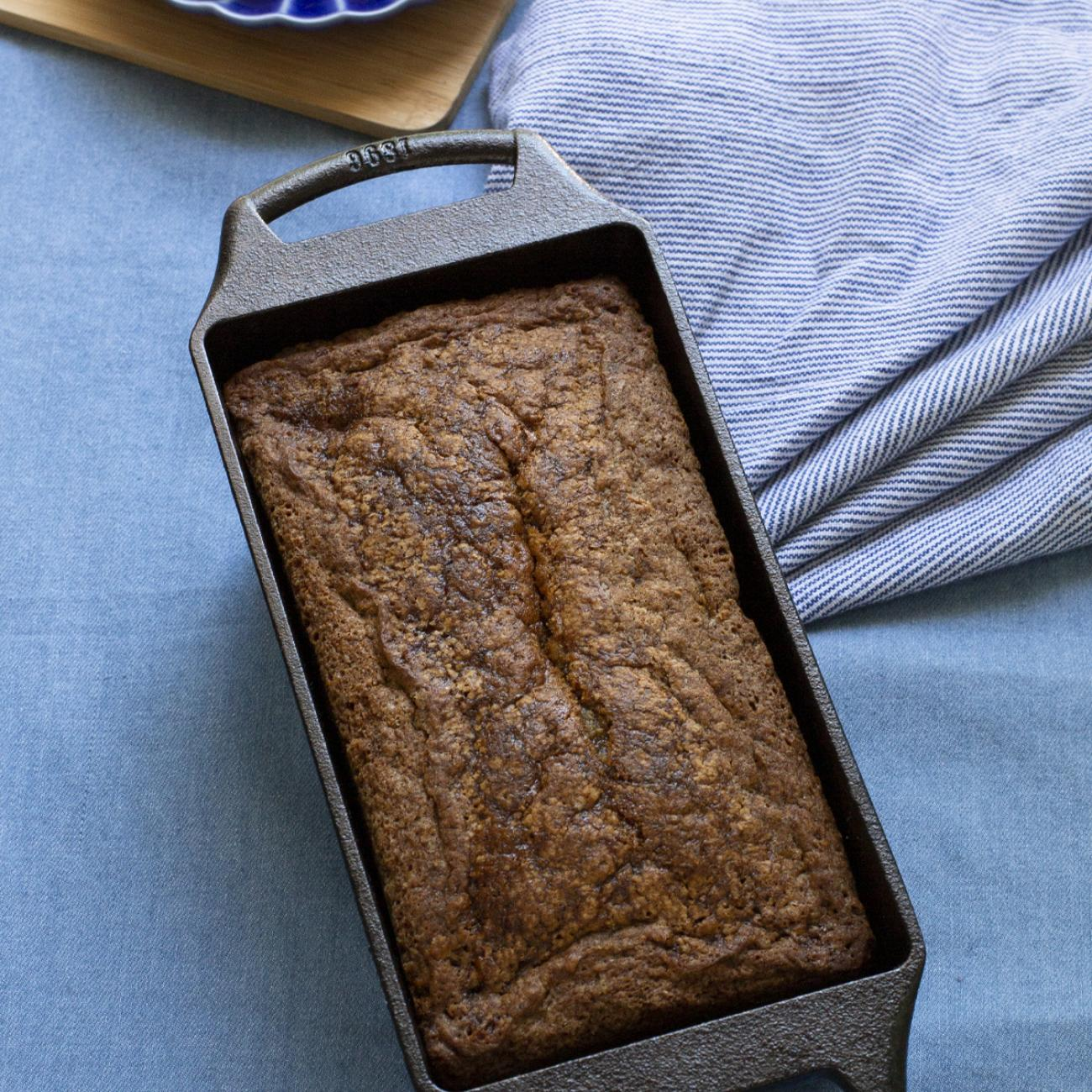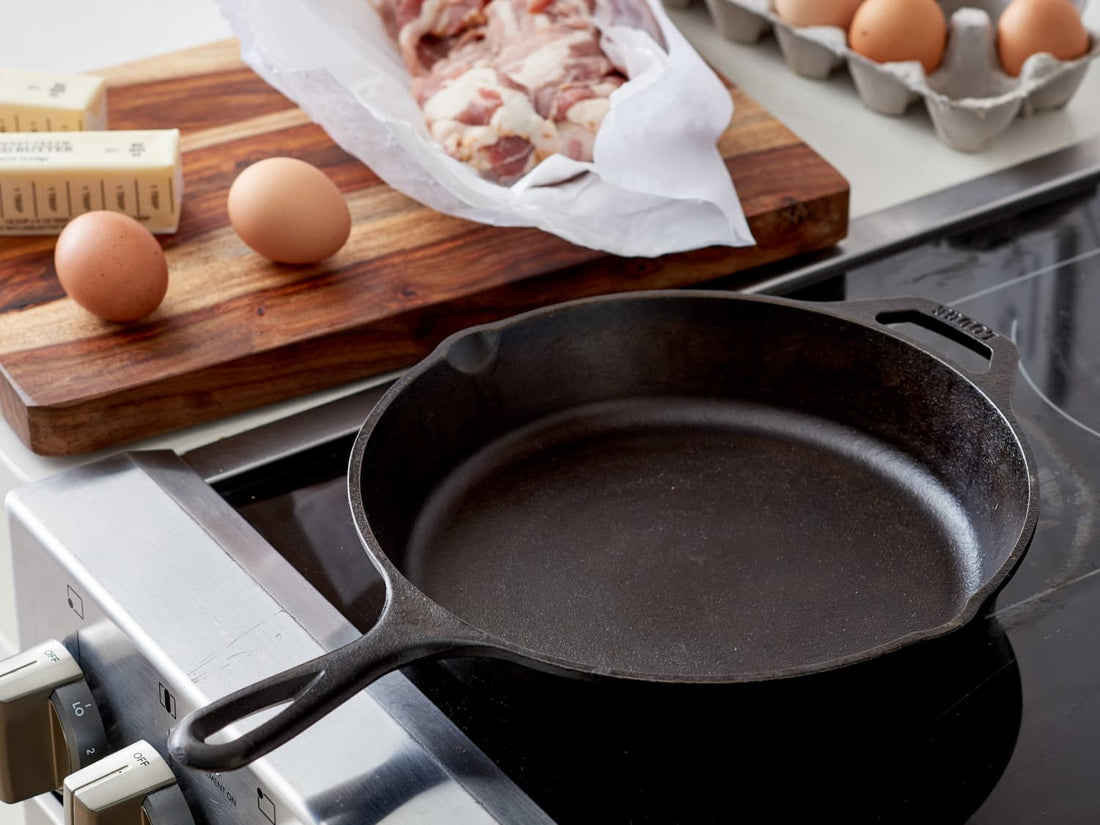Congratulations on your new cast iron pan! Maintaining it can sound intimidating, but we've created this guide to help you build and keep the perfect layer of seasoning on your cast iron! We sell Lodge cast iron, and many of our tips come straight from the cookware company themselves. We love their American-made, seasoned cast iron cookware because it is perfect for beginners, and chefs, and home cooks of any skill level. Their pre seasoned cookware make it beginner friendly and ready-to-use straight off the factory floor!
Before we get into cooking with cast iron, we want bust some common myths of cast iron cookware– These tips come straight from the Lodge website, so we promise you can trust them!
"You can't use soap on cast iron!!"
Well, yes and no. You can't use lye soap on cast iron. Lye will eat through your seasoning quicker than any other cleaning method. However, it is generally not a recommended cleaning method due to its inherent hazards when it comes into contact with human skin. Thankfully, modern dish soaps don't contain lye and are perfectly safe to use on your cast iron cookware. In fact, Lodge encourages customers to use mild dish soap to clean cast iron. The seasoning on Lodge cast iron is fairly resilient and can withstand a little bit of soap, water, and a good scrub with a brush to remove any stuck on food. Ensuring that there is no food stuck on the pan's surface will make your layers of seasoning smoother and more effective. Using soap and warm water will also ensure that there is no cross contamination between foods that could make you sick!
"Rusty Cast Iron Pans Can't Be Saved."
While rust can happen, it can be easily removed; simply scrub the area with a chain mail scrubber, steel wool, or a stiff bristle brush to remove rust. If your rusty pan doesn't respond well to soap and a scrubber, you may need to try a stronger method of cleaning. A very popular cleaning method to remove rust spots includes soaking the pan in one part distilled white vinegar and one part water for 30 minutes. After soaking, use a stiff bristled brush to gently scrub the rust out of the skillet. This process can be repeated several times to fully remove the rust. Once you have removed all of the rust, you can move on to the re-seasoning process to restore your pan's protective coating. To re-season your cast iron pan, use your preferred oil, we like to use vegetable oil or canola oil. Season the pan by adding a small amount of vegetable oil to the pan, then use a paper towel to coat the entire surface with a very thin layer of oil. Use a dry cloth or paper towel to ensure there is no excess oil left in the pan. If you are re seasoning a pan that has had all of its seasoning removed, you will want to place the skillet upside down in the oven. Set your oven to 450-500 degrees F for one hour. You can place a large baking sheet or aluminum foil on the bottom rack to prevent any excess oil from dripping off of the hot pan. Allow your re seasoned pan to cool inside the oven. Remove the pan and store it in a dry place. To prevent rust from returning, dry promptly after each use, and finish with a light layer of cooking oil.
"You Can't Use Cast Iron On Glass Top Stoves."
Now this one is trickier, because you can use it on glass tops, but that doesn't always mean that you should. If you plan to use your cast iron cookware on your stove top you'll want to be very gentle when placing or moving the pan. Cast iron can easily scratch or crack a glass top if you're not cautious while using it. That being said, it is perfectly fine to use cast iron on a glass top or even induction cook top!
If you're still too nervous to use it on your glass top, don't worry- cast iron pans can be used on almost any heat source! You can use cast iron cookware on any kitchen stovetop, outdoor grill, or open campfire. Because Then take it straight to the table to serve.
Now that we've established the do's and don'ts of cast iron, let's talk about seasoning– what is it, why do we do it, and, most importantly, how do we do it?
Seasoning refers to the oil that is baked onto cast iron cookware through a process called polymerization. It gives your cookware that classic black patina. Seasoning forms a natural, easy-release cooking surface, comparable to the surface of nonstick cookware, that will prevent stuck on food. It also creates a protective coating that helps prevent your pan from rusting. It may take a little extra care, but a well-seasoned cast iron pan will last for over a decade. Your Lodge cookware will come pre-seasoned and ready to use.
There are two ways to maintain the seasoning on your cast iron skillet. The easiest way is to cook with it. Every time you cook with oil, you're potentially adding another layer to the seasoning. Classic recipes like baking cornbread or frying chicken are great ways to build up a flavorful, strong seasoning. Thanks to cast iron's incredible heat retention, there's no better way to get crispy fried chicken, flavorful roasted veggies, or a perfect loaf of bread. Some activities may remove a bit of seasoning, such as cooking acidic foods, using excessive heat, or scrubbing with abrasive utensils or scouring pads. As you use your new cast iron pan, you will want to use a clean towel to apply a thin layer of neutral oil after each wash to maintain a strong seasoning layer. Over time, this will develop a plastic like coating from the multiple layers of polymerized oil.

Lodge has a wonderful guide that shows you the benefits of each type of oil. We prefer to season our cast iron pans with canola oil because it is one of the most versatile and affordable options. Vegetable oil is also a great option to season cast iron because it is flavor neutral, affordable, and widely available. One important note is that olive oil should never be used to season your cast iron. While it is a great multi-purpose oil for cooking, it is not a suitable option for seasoning cast iron. Olive oil has a low smoking point, and if exposed to light for too long, can go rancid. Thankfully, rancid olive oil will not make you sick, but it can add an unwanted flavor to your food. Lodge's guide will show you which oils are best for different purposes, including seasoning, sautéing, roasting, and frying.

Now that you understand how to care for new cast iron, let's discuss how to cook with cast iron cookware!

To ensure even heating, gradually pre-heat the cast iron skillet on a similar-sized burner. Since cast iron holds heat, it's best to allow it to preheat over medium to low heat, as opposed to high heat. This can help prevent food from sticking. Don't forget to use a hot handle mitt because the handle will get hot! Once your pan is pre-heated, oil the pan with your choice of cooking oil or fat. Then simply add your food! (Note: if you want to use butter, start with oil, and then add butter right before you add your food.)Thanks to cast iron's incredible heat retention, there's no better way to get crispy fried chicken, flavorful roasted veggies, or a perfect loaf of bread. You can use any style utensils you prefer, but our favorite is a wooden spatula. Use the edge of your wooden spatula as a pan scraper to lift food stuck on the pan's surface. These bits of food will not only add flavor to your meal, but will also make cleaning your pan easier!
We hope you love your new pan and that ! If you ever have questions about cleaning, maintaining, or cooking with your cast iron cookware, do not hesitate to reach out to us at info@brownskitchen.com! Happy cooking!

